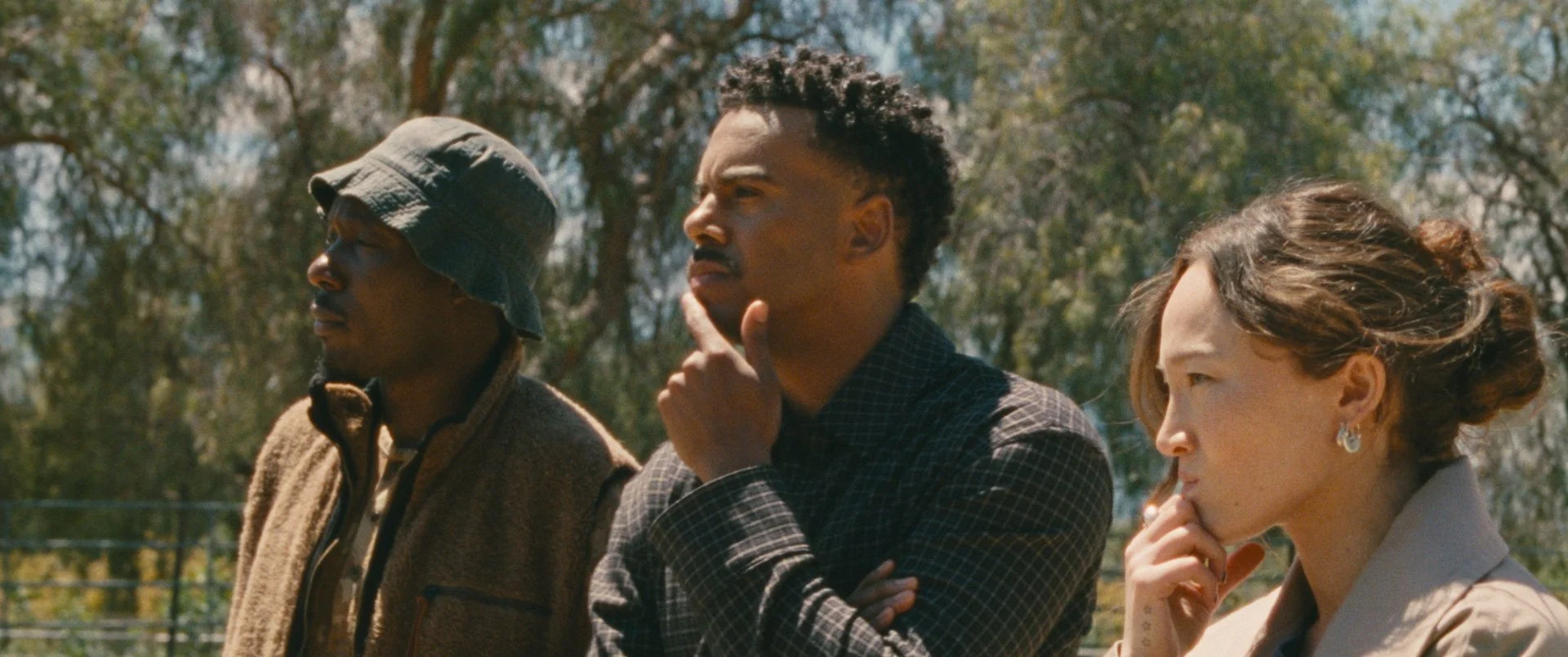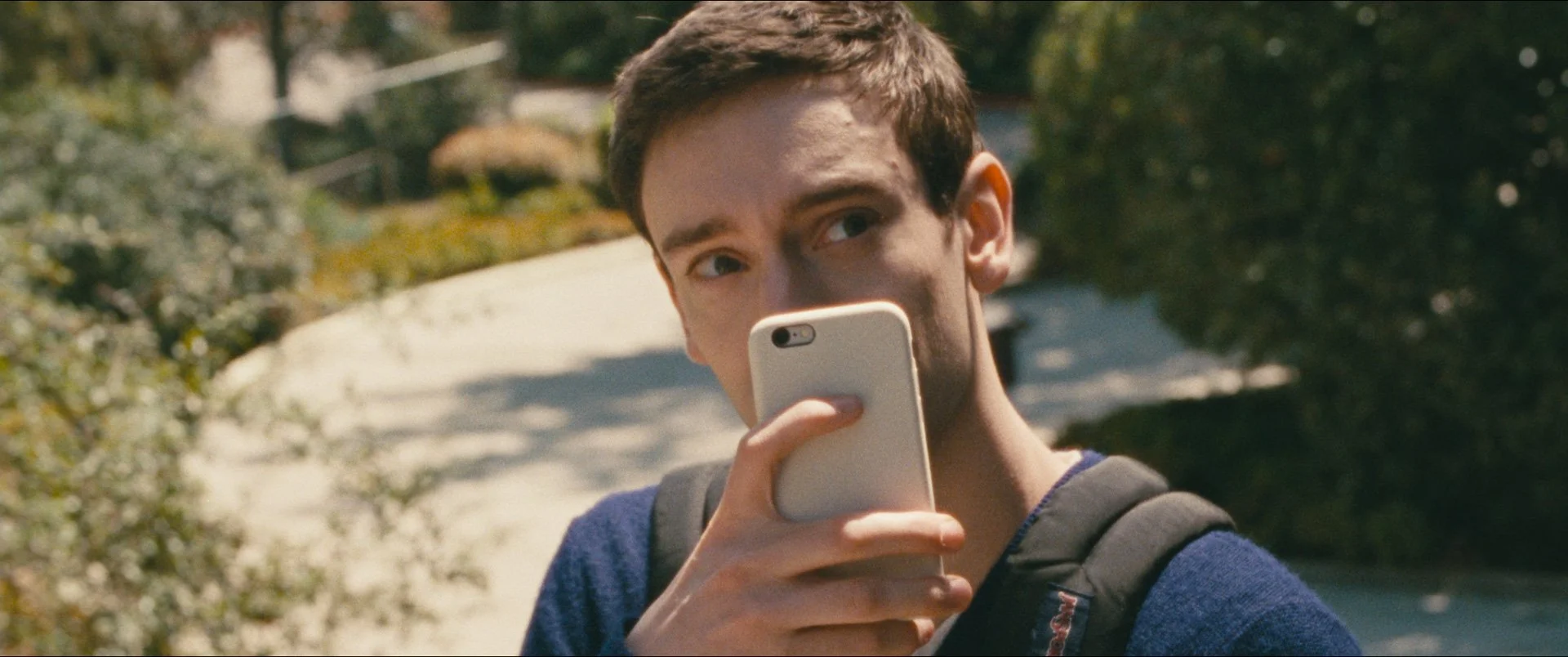Movie Review: “Lurker"; A Timely Influencer Commentary That We Need Right Now
10/12 ForReel Score | 4/5 Stars
The rise of influencer culture within the last few years has paved the way for countless entries within the cinematic medium to broach the topic with a sense of urgency. The subject matter itself is ripe for a complex and nuanced exploration into the intricacies that make up such a niche of social media, and countless movies over the years have attempted to capture this topic in a way that feels fresh and authentic. Whether it's the parasocial escapades of Aubrey Plaza and Elizabeth Olsen in 2017’s Ingrid Goes West or Joe Keery’s deliriously unhinged performance in 2020’s Spree exploring how the pursuit of an online following can grow deadly and dangerous by the minute, there are many different routes these movies can take, which can lead to exciting turns and fascinating bits of commentary about our own social media addicted lives. Yet, the real problem facing these types of movies is how to broach the topic in a way that not only stands apart from similar films that have preceded these entries, but how to convey the topic in a way that feels jarring and effective yet simultaneously never loses that grounded touch which makes the events and ideas FEEL vulnerable and real. And Alex Russell’s new psychological thriller Lurker might be the best example of this type of filmmaking within the last few years alone.
Image courtesy of Mubi
Lurker opens as we follow Matthew (played by Théodore Pellerin), a local retail employee within Los Angeles who works at a day job within a popular apparel boutique located in a business district of the city. His mundane shift becomes something inherently unique when local music sensation Oliver (played by Archie Madewke) arrives at his store in a surprise appearance, instantly bonding with Matthew over his shared interest in his specific genre of music. This in turn leads Matthew to find Oliver on social media, and after a few smaller interactions, Matthew is eventually invited to join in Oliver’s crew as a photographer, shuffling around with the young music artist day after day as he pursues his next big opportunity within the industry. At first, Matthew is ecstatic, not only to make a name for himself within the art world at last, but to also spend time close to a local sensation. Yet, as he quickly discovers, the influencer world is cutthroat. Many people within Oliver’s crew are also vying for the same amount of power and relevance at any cost necessary, simultaneously dragging their competition down. Yet, Matthew isn’t going down without a fight. You see, he has some ulterior motives in mind for how to get Oliver’s attention, and as the blurred line between reality and fiction grows hazier by the minute, Matthew begins to question his inherent role within the crew and his own psychological wellbeing in the process.
It would be easy to write off Lurker as a surface level satire on influencer culture and the game of “relevancy tag” that has invaded so many social media platforms as of late, yet the film manages to be so much more than this. So many moments of Lurker are devoted to micro-interactions between Oliver’s crew and Matthew himself, in which we see that these devoted people Oliver has hand picked to surround himself with are nothing more than an empty echo chamber. These individuals, including Matthew, don’t care about Oliver as a person. They instead care about Oliver as a symbol. They feed into his inner dialogue and psyche with reassurances and affirmations without taking the time to actually understand Oliver as a person and what he ultimately needs. He is a representation of the fame and fortune that they all want to seek and attain, no matter what it takes. Yet, as each member of the group slowly realizes, the only thing standing in the way of this…is each other.
Image courtesy of Mubi
As the film starts off in lighthearted territory, laying a firm foundation for this story, it is truly the downward spiral in Lurker that really elevates the material overall. Towards the beginning of the film, we watch as Matthew interviews Oliver for segments of a documentary that Matthew hopes to make about Oliver’s career, watching through the distinct point of view of an old camcorder (and, in essence, Matthew’s viewpoint in particular) as Oliver details the specific instances of his and Matthew’s dynamic that mean the most to him. Yet, these poignant moments soon take on a more sinister underlying as the film progresses, and we watch as Matthew’s characterization shifts to something darker and more intense. One of the greatest things about Lurker is how unpredictable it is, both in plot itself and in characterization. We think we know who Matthew is as a protagonist, but at the same time we question whether we really do or not. Like how Oliver does not know whether he can trust or rely on his inner circle, can we as audiences trust Matthew and his motives as the film progresses?
In portraying a figure such as Matthew, Théodore Pellerin does fantastic work anchoring the film around his character and performance while also affording the supporting cast opportunities to land definitive moments and to shine with ease. His character turn over the course of the runtime is the heart and soul of the film’s dramatic stakes, and Pellerin is able to balance both sides of his character with capable and effective flourish. This is further accentuated by his interactions with Oliver, which feel grounded and nuanced courtesy of Archie Madewke. This is truly a role that allows Madekwe to go all in to great effect, highlighting so much of Oliver’s vulnerability while at the same time instilling a distinct point of view onto the character that makes audiences empathize with and understand him. Sunny Sunjic stands out as Jamie, one of Matthew’s friends from the store, who manages to play a central role within the plot’s events and draws attention to another facet of influencer culture that manages to land a heavy impact as well. Oliver’s crew includes great appearances by Zack Fox, Daniel Zolghadri, and Havana Rose Liu, all portraying distinct characters who, similarly to Matthew, want to attain that sense of fame and success, but in a more patient and calculated manner.
Image courtesy of Mubi
One element within Lurker and its runtime that manages to elevate the material to a higher level is within Alex Russell’s fantastic script. The ideas presented in relation to the subject matter are witty and sharp, clearly focusing on a hyper realized facet of modern day society through such an over the top lens while keeping a finger on a grounded pulse in order to make the material flow in a nuanced fashion. The dialogue within the film in particular is such a distinct example of this. The interactions between characters feel so naturally awkward and unwieldy, and Russell ensures that audiences feel every unflinching moment of this. Each character dynamic and moment within the film is laced with a sense of hostility and embarrassment, even if the material itself doesn’t seem to be harboring this atmosphere inherently. This shift in tone not only enthralls audiences, but furthermore makes the stakes and motives here feel so much more believable, increasing the intensity in each second to great effect. This grounded atmosphere builds to a peak as the film reaches the third act’s conclusion, a portion of the film that contains one of the most effective yet quietly disturbing and rattling endings to a film in the last calendar year alone. The film leaves you in such a disquieting state, allowing for the chance to really reflect on and ponder so many of the key ideas and themes here through such a personal lens. I know I haven’t been able to shake the film for weeks.
Lurker is ultimately a film that asks much out of its audience, and this is particularly exemplified through many of the narrative swings on full display throughout the film’s runtime. Certain thematic elements and plot moments do convey an “over the top” slant to the material, and specific moments almost require a suspension of disbelief in order to navigate through the territory; there’s a contextual presumption that certain moments almost feel specifically orchestrated for maximum emotional impact. Yet, if audiences are able to wade through some of the heavy thematic content on display, they’ll find a timely, impactful, and often eye opening commentary on influencer culture and identity that feels incredibly vulnerable and nuanced, especially in this social media infused age.
Image courtesy of Mubi
One of the specific lyrics within one of Oliver’s songs in the film reads “What is the difference between love and obsession?” Such a lyric really speaks to a lot of the film’s thematic content, as we witness a fan who walks quite blatantly across the line of admiration and compulsion, yet this is a lyric that ultimately extends beyond the confines of the film itself and into a real world exploration and understanding of its main idea. As I opened my social media apps after watching the film and scrolled through my carefully selected algorithmic content, I was treated to a plethora of influencers across all subjects and topics, carefully doling out content with enthusiasm and charm. Yet, as I watched this content, this lyric rang true in a more complex and fundamental way than just the key idea of Matthew’s characterization and arc inside of the movie. What is the difference between love and obsession in this social media age? What is the difference between clear love and admiration for a subject or topic and the desire to craft meaningful content that helps foster an understanding of and love for the area, or the desire and obsession to remain relevant and important by pursuing such topics as this point of interest? These are all questions that Lurker poses to its audience throughout its runtime, and although audiences might go in expecting a twisty psychological thriller, they’ll leave with that as well as a newfound self consciousness about their own relationship with social ambitions.





